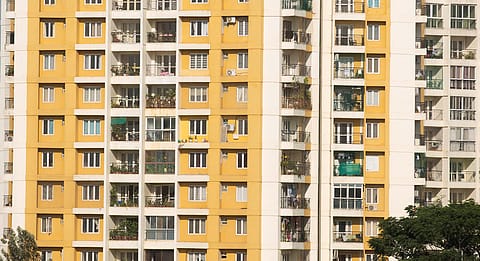Reconsider 18% GST on FSI; it'll destabilise projects: CREDAI to FM
Real estate developers warn of increased housing costs and project disruptions; say the move could raise property prices by 10% and derail affordable housing initiatives

Real estate developers have requested the government to reconsider its decision on the proposal of Goods and Services Tax (GST) on Floor Space Index (FSI) or additional FSI charges, saying it could prove counterproductive and destabilise the financial foundations of numerous projects.
In a letter to Finance Minister Nirmala Sitharaman, real estate developers’ association CREDAI strongly urged the central government to reconsider the proposition of charging 18% GST on FSI and additional FSI charges paid to local authorities for real estate projects. The move comes after a media report said GST Council in its meeting on Saturday could decide on implementing 18% GST on FSI charges.
CREDAI says the move would have a "substantial incremental impact" on project costs, further pushing housing prices up by around 10% across various parts of the country. Imposing GST on these charges, either retrospectively or prospectively, would also affect not just housing demand but also supply as it would raise significant economic and viability concerns, the industry body says.
Floor Space Index (FSI), also known as Floor Area Ratio (FAR), determines the maximum permitted floor area, which can be developed on a given plot of land. The FSI controls the density of construction in an area.
CREDAI says that retrospective clarification of GST on such payments would burden real estate developers with an "enormous amount of unforeseen liabilities", disrupting the financial and cost planning of on-going and completed projects.
“The resulting financial pressures could potentially lead to stalled developments and jeopardise the financial security of homebuyers invested in these projects. Even prospective application would substantially elevate construction costs, imposing additional financial burdens on end consumers and deteriorate housing affordability issues, hindering the collective mission towards ‘Housing for All’,” says the industry body.
Boman Irani, president, CREDAI, says FSI or additional FSI charges constitute a significant part of the project cost, and the proposal to impose 18% GST on such charges could prove to be counterproductive and act as a deterrent to housing supply and demand, owing to additional financial obligations and increasing housing prices as a direct consequence. “We strongly request and recommend to the Government to keep the FSI charges exempt from GST. Any retrospective or prospective charges could destabilise the financial foundations of numerous projects, hampering the ability to facilitate timely possession by developers.”
Recommended Stories
The industry is already burdened by rising raw material costs, which has pushed the property prices up. “Such additional charges will make affordable housing projects economically unviable, potentially pushing the prices upwards by 7-10% and directly impacting the purchasing power of the middle-class segment – which constitutes 70% of total homebuyers,” says CREDAI.
Jash Sandip Panchamia, Executive Director, Jaypee Infratech Ltd, also says the move could significantly escalate the cost of housing units, especially when there is no Input Tax Credit (ITC) available to developers. "Property buying already carries a substantial tax burden, including GST, stamp duty, and registration fees, which buyers must bear. Introducing an additional tax would only increase the financial strain on homebuyers."
In the Union Budget 2024, Finance Minister Nirmala Sitharaman had emphasised encouraging states to lower high stamp duties on property transactions. Panchamia urged the government to further focus on reducing overall taxes in the real estate sector. "Lowering the tax burden would not only benefit homebuyers but also boost the housing market and contribute to economic growth."
What’s legal point of view?
(INR CR)
The legal position in this matter is relatively straightforward, says CREDAI. “Notification no 14/2017 and 12/2017 clearly lays down that services supplied by Central or State Governments, local authorities or Governmental authorities, by way of an activity in relation to a function entrusted to a municipality under article 243W of the Constitution, will either be exempted from GST or will be treated neither as a supply of goods nor a supply of service and hence, GST will not be chargeable on the same."
CREDAI says the provision of FSI and the levy of various charges and fees squarely fall within the functions envisaged in the twelfth schedule of the constitution, excluding the same from levy of GST.